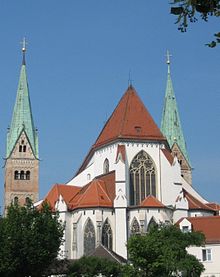Roman Catholic Diocese of Augsburg
|
Diocese of Augsburg Dioecesis Augustanus Vindelicorum |
|
|---|---|

Augsburg Cathedral
|
|
| Location | |
| Country | Germany |
| Ecclesiastical province | Munich and Freising |
| Metropolitan | Archdiocese of Munich and Freising |
| Statistics | |
| Area | 13,250 km2 (5,120 sq mi) |
| Population - Total - Catholics |
(as of 2012) 2,298,454 1,351,703 (58.8%) |
| Parishes | 1,004 |
| Information | |
| Denomination | Roman Catholic |
| Rite | Roman Rite |
| Established | 6th Century |
| Cathedral | Augsburg Cathedral |
| Co-cathedral | Dillingen an der Donau Co-cathedral |
| Patron saint |
St. Ulric of Augsburg St. Simbert of Augsburg St. Afra |
| Current leadership | |
| Pope | Francis |
| Bishop |
Konrad Zdarsa Bishop of Augsburg |
| Metropolitan Archbishop |
Reinhard Marx Archbishop of Munich and Freising |
| Auxiliary Bishops |
Anton Losinger Florian Wörner |
| Vicar General | Harald Heinrich |
| Emeritus Bishops |
Viktor Josef Dammertz, O.S.B. Walter Mixa Josef Grünwald Maximilian Ziegelbauer |
| Map | |
 |
|
| Website | |
| bistum-augsburg.de | |
Diocese of Augsburg is a diocese of the Catholic Church in Germany. The diocese is a suffragan of the Archdiocese of Munich.
According to the acts of the martyrdom of St. Afra, who with her handmaids suffered at the stake for Christ, there existed in Augsburg early in the fourth century a Christian community under Bishop Narcissus. St. Dionysius, uncle of St. Afra, is mentioned as his Successor.
After the Congress of Vienna, where the diocese was restored, Franz Karl von Hohenlohe-Schillingsfurst (d. 1819) was appointed bishop and Joseph Maria von Fraunberg was soon called to the archdiocese of Bamberg. There, they devolved upon their successors the important task of rearranging the external conditions and reanimating religious life, which had suffered sorely. Ignatius Albert von Riegg (1824-36) was successful in his endeavors to further the interests of souls, to raise the standard of popular education through the medium of numerous ordinances and frequent visitations. He assigned the administration and direction of studies in the Lyceum to the monks of the Benedictine Abbey of St. Stephen in Augsburg, founded by King Ludwig I of Bavaria (1834).
Petrus von Richarz (1837-55) displayed energy and persistent zeal in promoting the interests of his diocese and the Catholic Church in general, and encouraged the giving of missions to the people, the establishment of many religious institutions for the care of the sick and for educational purposes, and carefully superintended the training of the clergy. The same spirit characterized the labours of the succeeding bishops: Michael von Deinlein (1856-58), who after a short episcopate was raised to the Archbishopric of Bamberg; Pankratius von Dinkel (1858-94), under whom both seminaries and the deaf and dumb asylum were established in Dillingen, and many monastic institutions were founded; Petrus von Hotzl (1895-1902) whose episcopate was marked by the attention paid to social and intellectual pursuits, and the number of missions given among the people as well as by the solemn celebration of the beatification of the pious nun Crescentia Hoss. He was succeeded by Maximilian von Lingg.
...
Wikipedia
